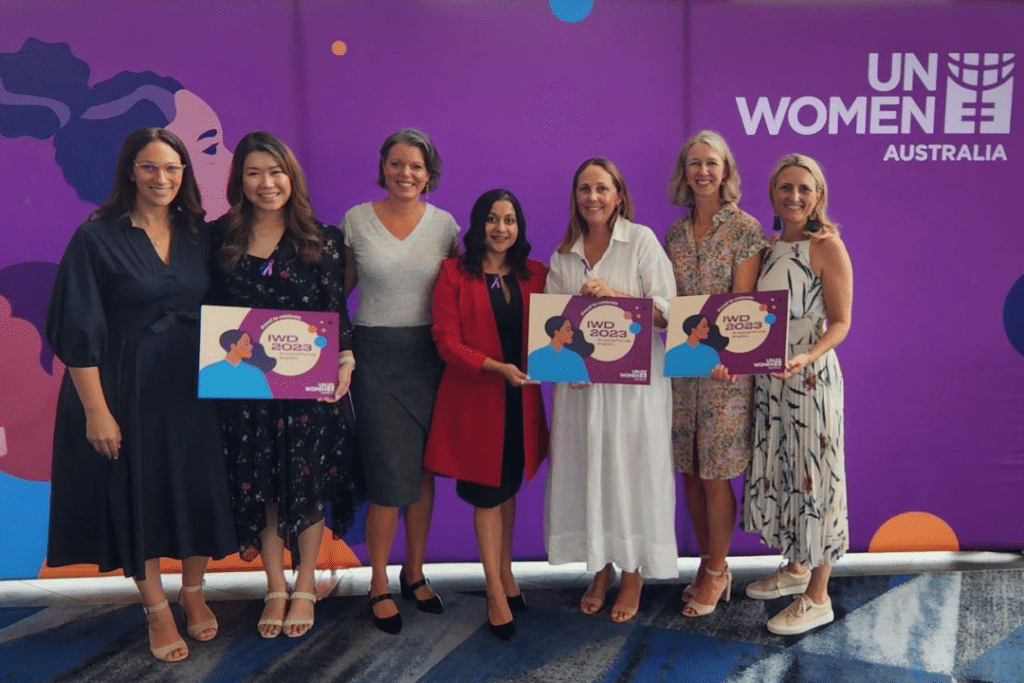A strong and diverse workforce is essential across the science, tech, engineering, and mathematics sectors (STEM) to address some of our nation’s most confronting and enduring challenges: including domestic and family violence, climate change, equality, and social justice.
It’s also vital for tapping into the full potential of the population, driving innovation, and especially for safe-guarding the future of Artificial Intelligence (AI) so not to perpetuate the same biases and discriminations of the past.
As the UN Women’s International Women’s Day event series held around the country last Friday powerfully hammered-home, there are codes that need unlocking to ensure Australia’s STEM workforce truly reflects the community it aims to serve.
Australia’s Minister for Women, Katy Gallagher, addressed the connection between women’s equality and tech and shared examples of how tech can support efforts to increase women’s safety, financial security, and economic opportunity.
But in 2021, just 29 per cent of the STEM workforce was found to be made up of women, and just a tiny 15 per cent of occupations requiring STEM qualifications were held by women.
As Gallagher firmly stated: “This is not good enough”.
There is more work to be done in schools and generally across society in encouraging girls to pursue STEM studies and qualifications.
But there is also much to be done on retaining women in STEM, and part of the solution is addressing common work life conflict barriers and investing in fostering a family-friendly culture from within, from the top down.
Back in 2019, a survey of 3000 people working in STEM by Male Champions of Change and Accenture highlighted some of the issues confronting STEM sectors.
It found that 66 per cent of women still feel their voices are devalued at work, while everyday sexism continues to be a pervasive driver behind women’s attrition. A lack of flexibility was also found to be a major factor in women’s attrition. The report found this lack of flexibility, alongside women reporting they still take on the majority of household duties, was disrupting women’s ability to excel at work.
We know from the pandemic, broadly-speaking, that greater workplace flexibility is something all employers can adopt and all employees can benefit from. In fact, we absolutely need leaders and teams to have a flexible mindset to truly harness innovation and solutions to stay competitive and relevant in an ever-demanding world.
In 2022, the Australian Government’s STEM Equity Monitor found that Australia is experiencing unprecedented skill shortages across STEM fields. This National annual scorecard on gender participation in STEM clearly shows the solution to these shortages: women.
The STEM Monitor revealed a leaky pipeline, with just 23 per cent of STEM senior managers being female, and women accounting for a tiny eight per cent of CEOs across STEM industries.
Clearly, there are roadblocks on the path for women excelling in STEM.
As Lisa Harvey-Smith wrote at the time of this report being released, “we need structural workplace changes”. She highlighted one key avenue as being to introduce more flexible work options, while also broadening access to paid parental leave.
Of course flexibility and paid parental leave are just a few pieces of the puzzle to addressing women’s attrition in STEM. We must also work to solve the bias, discrimination, and sexual harassment that continues to hinder women’s careers here, especially as the Respect@Work inquiry found that sexual harassment is more common across male-dominated industries.
Women unlock technology
There’s no doubt that access to technology really is key to levelling the playing field; unlocking women’s potential to be heard, to be connected, to drive change around global shared experiences, like sexual harassment.
MeToo founder Tarana Burke highlighted the role of tech and her belief in the “power of technology” in addressing the challenges ahead, highlighting what her own small team has been able to address during the #MeToo movement. She spoke about the powerful digital resources they’ve created for those who don’t have the support they need to go to therapy, as well as other innovative and accessible online tools to stay safe. As she said, “we have to be more active than the trolls.”
This International Women’s Day, in line with UN Women Australia’s call on “Cracking the Code: Innovation for a gender equal future”, we firmly believe that employers must make real policy adjustments and changes to address the systemic issues behind women’s attrition at work. Employers must consider how the majority of primary paid parental leave continues to be taken by women, how inflexible work practices drive women out, as well as the role of sexism and discrimination that may be undoing all the otherwise good work that employers hope to achieve.
Creating a “family-friendly culture” is about more than making working life a little easier for new parents and carers. It’s about acknowledging the fact we all have lives outside of work. We have interests and hobbies and friends and loved ones and people who depend on us. It’s also about creating a culture of safety and respect: where violence, sexism, bias, and discrimination are simply not tolerated. And it’s about continually working at a culture that genuinely backs the diversity that any good company says they want to achieve across their workforce.
The extraordinary global tech-marketing leader Jackie Lee-Joe, whose career has seen her criss-cross the world on the forefront of tech-innovation with her family in tow, provided an excellent example of what can be achieved and the kind of talent a company can attract, by investing in a diverse and flexible culture. She credited her move to Netflix because it had done so much more on diversity than other companies. Netflix is known for its generous paid parental leave, and for fostering a culture of “freedom and responsibilities” which it says encourages team members to make their own decisions about how they take leave.
As Lee-Joe told the UN event, “technology carries with it culture”.
The tech we use will ultimately reflect the culture where it was created. The innovation we can achieve depends on the opportunities provided to a diverse range of talent.
We know this IWD2023 UN Women’s Cracking the Code’ theme will mean different things to different people. We also know, that many of us in our lifetime will be confronted by competing work and life pressures, by caring responsibilities and real health and welfare concerns that can exclude us from the workforce. Being able to access a job, with an employer who ‘gets it’, can ‘make or break’ our career, our wellbeing and our families.
We cannot afford to under-estimate the importance and impact of inclusive, family-friendly workplaces as key to unlocking and cracking the code to ensure greater diversity is achieved not only across STEM but every sector, across every workplace.


